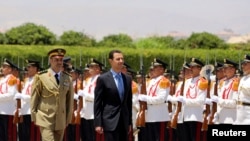Syrian President Bashar al Assad took the oath of office Wednesday for a third seven year term in office, amid a three-year-old civil war across much of the country.
Unlike his two previous ceremonies, President Assad took the oath of office at the presidential palace, rather than in front of parliament. Several analysts suggest the move was made for security reasons.
Assad succeeded his father as president in 2000 and has weathered a brutal and bitter conflict for the past three years. The Syrian president struck a tone of confidence, blasting his enemies inside and outside the country.
He insists Arab and Western countries that have supported his opponents, whom he calls “terrorists,” will soon pay a price for that support.
Assad also thanked his close allies, Russia, China, Iran and Lebanon's Hezbollah group for helping his government. He said his allies support the principle of non-interference in the domestic affairs of a U.N. member state, which is part of the U.N. Charter.
The embattled Syrian president also thanked those he called the “honorable” Syrian people for voting for him, insisting it was their response to the Arab Spring slogan that the people “want the downfall of the regime.”
Assad complained the fighting in Syria had devastated the country's economy, ruining its once vibrant tourism business, despoiling its infrastructure, including electricity stations, gas pipelines and oil fields in the north and east of the country. “But,” he said,”if the price Syria has paid is high, then our achievements in the future will be even higher.”
Syria scholar Joshua Landis heads the University of Oklahoma Middle East studies department. He says Assad sounded confident, because things have been going his way lately.
"His military campaigns have been by and large successful, whether it is in the Qalamoun region in shutting off the Lebanese back door to rebels, whether it is in retaking Homs, surrounding neighborhoods in Damascus and Aleppo. He is well on his way to retaking Aleppo, Syria's northern capital. So, he has struck a tone of confidence,” said Landis.
But Institute for Near East and Gulf Military Analysis chief Riad Kahwaji told VOA Assad was living in a world that is “delusional.”
“[Assad] is still talking about Syria as if nothing is really happening. He does not acknowledge that there is a civil war happening ... does not want to acknowledge that a large chunk of the country is out of control, out of his control, and that he is in virtual isolation and that more than half of the Syria [electorate] did not even have the chance to vote or have a say in this last election,” said Kahwaji.
American University of Beirut political scientist Hilal Khashan said Assad was profiting from the “protracted conflict in his country and that he “seems to enjoy it” because it “keeps him in power.” Khashan argued the Syria conflict was “not likely to end any time soon,” and Assad may well be in power for a long time to come.




